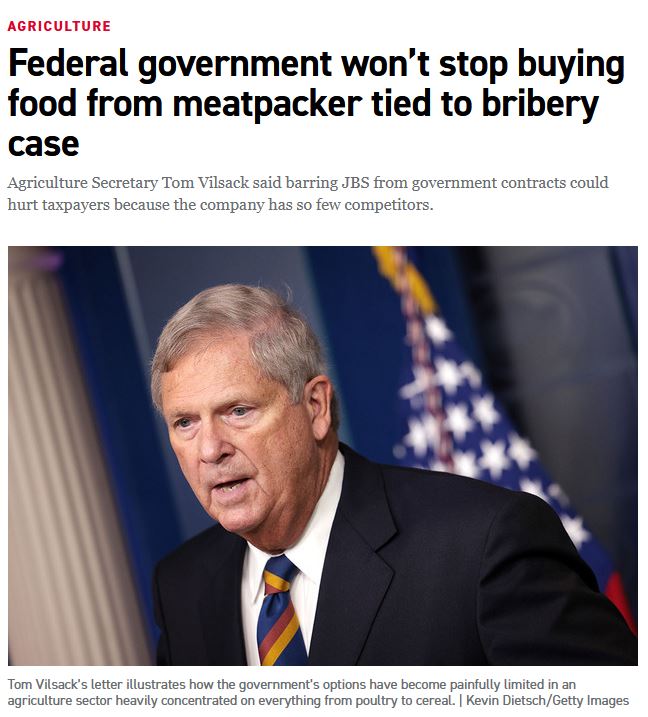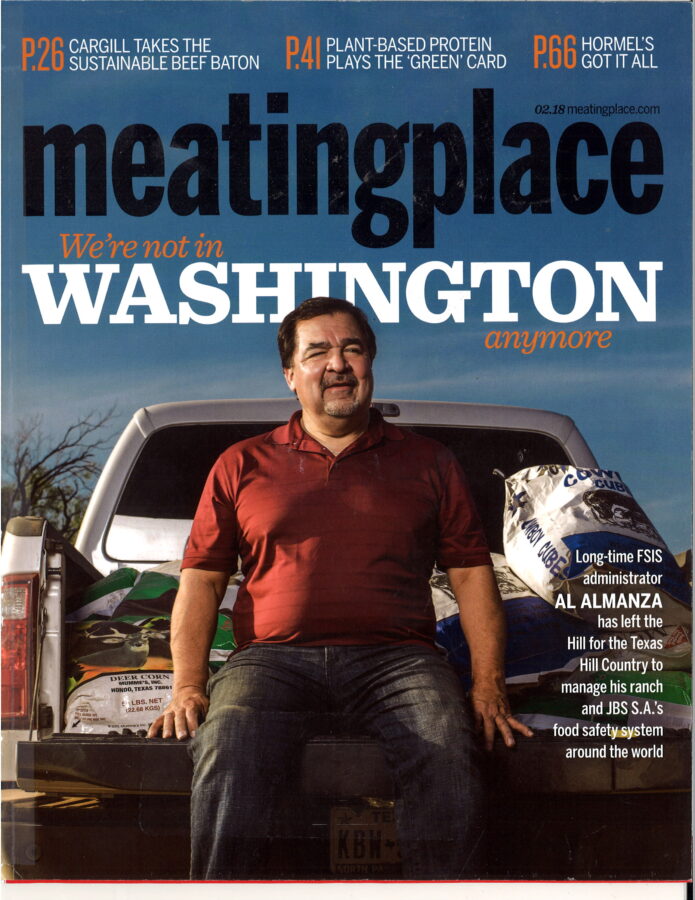Federal government purchasing shouldn’t discriminate against local/regional suppliers
 Politico bribery article
Politico bribery article
So what does JBS, the biggest meatpacker in the world, have over USDA?
In 2019, as Brazilian meatpacker JBS was proving itself as a leading global criminal, instead of protecting American citizens by revoking JBS corporate charters and grants of inspection for its many criminal violations, our federal government funded JBS with lucrative preferential meat purchasing contracts – JBS a big winner in USDA trade war relief contracts.
Evidence of corruption
After 40 years of government service, why did the Food Safety Inspection Service (FSIS) Administrator, Al Almanza, leave the agency and go to work for JBS? Just prior to his new employment, Almanza allowed JBS’s rotten meat into our country for 90 days after Brazilian authorities made the world aware of the tainted shipments. The U.S. was the only developed country that didn’t cut off imports of JBS’s rotten meat. So, who had Almanza really worked for as he cashed his government checks? Meanwhile, as they had consistently done during Almanza’s tenure, USDA continued their confrontational and abusive treatment of small plant operators. Those plants were running safer, more humane, more sustainable, and far more resilient operations.

Al Almanza went to work for JBS after 40 years at USDA.
Almanza’s time at USDA saw a wildly-spinning revolving door from industry to agency and back again. It was a time when small USDA-inspected processing plants were driven out of business. The four largest multinational meat companies cooperated to eliminate competitors and monopolize the meat industry. Assisted by USDA, the big-four meatpackers gained control of 85% of our nation’s steer and heifer slaughter – the highest level of market concentration in history, nearly double compared to the Robber Baron era of a century ago.
Along with USDA, the Justice Department and the Federal Trade Commission have ignored anti-competitive practices, which drive independent meat plants and family farmers and ranchers out of business. Without a more direct connection to the end consumer, new and existing local/regional infrastructure cannot survive against the government-enabled big-food predators. Corporate control of our government agencies has enthroned big food, now ruling with complete authority over America’s food supply.
Prioritizing government purchasing in support of small processors and local/regional food systems would ensure the survival of new and existing small plants, along with future food security and a better climate, eventually restoring life in the rural communities that feed us.
Secretary Vilsack talks a good game with his descriptions of circular, regenerative, and promises of more sustainable economies, but the programs he mentions in the Politico article miss the mark. Local/regional meat processors, after stepping up and feeding us reliably during the pandemic, while the big plants failed, continue to die along with rural America.
The highest and best use of taxpayer money would be for the government to buy from the food system that represents our future food security, not from the companies that threaten it.
May, 2023 – Matthew Greco with My Health Forward
and Mike Callicrate, owner of Ranch Foods Direct













Thanks again for the post. But how do we (average citizens) make a difference? Knowing all this helps, but what actions specifically can be taken?
Buy local and support new infrastructure in your community: https://nobull.mikecallicrate.com/2022/09/10/better-meat-requires-building-connections-with-new-food-partners/
Thank you. I do these things (buy from local farmers etc) as much as possible. Forgive me for more questions: I do not mean to sound ungrateful but just buying locally doesn’t seem to be enough. I think the problem most of us have is, we do not know who to contact. Please assume that we live in a place where our State’s politicians support local farming over Big Ag. Also assume we do not work in Ag so we do not entirely informed about the decision makers in this space. Still, most of us are very concerned about the food that we eat and where it comes from. What are we to do then? How do we know who to contact (and in what form) on any given bill, on any given issue?
Scott, Don’t assume our local and state politicians support local food systems.Very few actually do, as they got elected with support of monied interests. One of my favorite places to stay informed is https://farmaction.us/
I am in contact with my local politicians a few in Congress and locally. Food is a foreign country. I was on a Zoom meeting with a Senator in the Arizona legislature and brought up the issue of food and meat. It went nowhere. One man mentioned that he grew lettuce out of a tower and gave out information concerning where to purchase. One women had discussed it with her husband and there was no need to purchase organic because they were in good health. I never brought up the subject again and went back to my foreign country the farmers market of like minded. COSTCO is the winner and next Walmart then convenience.